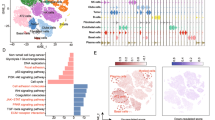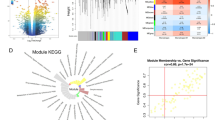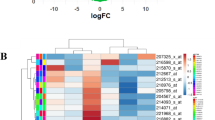Abstract
In-depth studies on the pathogenesis of endometrial cancer (EC) are critical because of the increasing global incidence of EC. Mitophagy, a mitochondrial quality control process, plays an important role in carcinogenesis and tumor progression. This study aimed to develop a novel mitophagy-based signature to predict the tumorigenesis and prognosis of EC. Data was downloaded from The Cancer Genome Atlas and Gene Expression Omnibus databases, and 29 mitophagy-related genes were downloaded from the Pathway Unification Database. EC patients were classified into two risk groups based on the two-key- gene signature, TOMM40 and MFN1, which were constructed using Cox regression analysis. A better prognosis was noted in the low-risk group. The model was validated for four aspects: clinical features, mutation status, clinical therapeutic response, and immune cell infiltration status. Moreover, according to the contribution to the risk model, TOMM40 was selected for further in vitro experiments. The silencing of TOMM40 inhibited mitochondrial degradation; suppressed cell proliferation; induced cell apoptosis and G1 phase cell cycle arrest; inhibited migration, invasion, and epithelial-mesenchymal transition; and suppressed cell stemness. In conclusion, the mitophagy-related risk score provides a novel perspective for survival and drug selection during the individual treatment of EC patients. TOMM40 serves as an oncogene in EC and promotes tumor progression via a mitophagy-related pathway. Thus, TOMM40 is a potential therapeutic target in EC.









Similar content being viewed by others
Data availability
Data generated or analyzed during this study are included in this published article [and its supplementary information files]. Additional data and materials of the study can be obtained from the corresponding authors.
Abbreviations
- EC:
-
Endometrial cancer
- MSI-H:
-
Microsatellite instability hypermutated
- CNL:
-
Copy-number-low
- CNH:
-
Copy-number-high
- BNIP3:
-
Adenovirus E1B 19-kDa interacting protein 3
- TCGA:
-
The cancer genome atlas
- TME:
-
Tumor microenvironment
- FPKM:
-
Fragments per kilobase of transcript per million mapped reads
- TPM:
-
Transcripts per kilobase million
- GEO:
-
Gene expression omnibus
- AIC:
-
Akaike information criterion
- MRGs:
-
Mitophagy-related genes
- ROC:
-
Receiver operating characteristic
- IHC:
-
Immunohistochemistry
- mRNAsi:
-
MRNA expression-based stemness index
- OCLR:
-
One-class logistic regression machine learning algorithm
- IC50:
-
Half-maximal inhibitory concentration
- GDSC:
-
Genomics of drug sensitivity in cancer
- RSI:
-
Radiosensitivity index
- ICIs:
-
Immune-checkpoint inhibitors
- IPS:
-
Immunophenoscore
- PMSF:
-
Phenylmethanesulfonyl fluoride
- BCA:
-
Bicinchoninic acid
- siRNA:
-
Small interfering RNA
- RT-qPCR:
-
Real-time quantitative polymerase chain reaction
- CCK8:
-
Cell counting kit8
- OD:
-
Optical density
- SD:
-
Standard deviation
- MFN1:
-
Mitochondrial fusion protein mitofusin-1
References
Siegel RL, Miller KD, Wagle NS, Jemal A. Cancer statistics, 2023. CA Cancer J Clin. 2023;73(1):17–48. https://doi.org/10.3322/caac.21763.
Siegel RL, Miller KD, Fuchs HE, Jemal A. Cancer statistics, 2022. CA Cancer J Clin. 2022;72(1):7–33. https://doi.org/10.3322/caac.21708.
Cancer Genome Atlas Research N, Kandoth C, Schultz N, Cherniack AD, Akbani R, Liu Y, et al. Integrated genomic characterization of endometrial carcinoma. Nature. 2013;497(7447):67–73. https://doi.org/10.1038/nature12113.
Panigrahi DP, Praharaj PP, Bhol CS, Mahapatra KK, Patra S, Behera BP, et al. The emerging, multifaceted role of mitophagy in cancer and cancer therapeutics. Semin Cancer Biol. 2020;66:45–58. https://doi.org/10.1016/j.semcancer.2019.07.015.
Doblado L, Lueck C, Rey C, Samhan-Arias AK, Prieto I, Stacchiotti A, et al. Mitophagy in human diseases. Int J Mol Sci. 2021. https://doi.org/10.3390/ijms22083903.
Bertolin G, Ferrando-Miguel R, Jacoupy M, Traver S, Grenier K, Greene AW, et al. The TOMM machinery is a molecular switch in PINK1 and PARK2/PARKIN-dependent mitochondrial clearance. Autophagy. 2013;9(11):1801–17. https://doi.org/10.4161/auto.25884.
Imberechts D, Kinnart I, Wauters F, Terbeek J, Manders L, Wierda K, et al. DJ-1 is an essential downstream mediator in PINK1/parkin-dependent mitophagy. Brain. 2022;145(12):4368–84. https://doi.org/10.1093/brain/awac313.
Ahmed S, Kwatra M, Ranjan Panda S, Murty USN, Naidu VGM. Andrographolide suppresses NLRP3 inflammasome activation in microglia through induction of parkin-mediated mitophagy in in-vitro and in-vivo models of Parkinson disease. Brain Behav Immun. 2021;91:142–58. https://doi.org/10.1016/j.bbi.2020.09.017.
Onishi M, Yamano K, Sato M, Matsuda N, Okamoto K. Molecular mechanisms and physiological functions of mitophagy. The EMBO Journal. 2021;40(3). doi:https://doi.org/10.15252/embj.2020104705.
Um JH, Yun J. Emerging role of mitophagy in human diseases and physiology. BMB Rep. 2017;50(6):299–307. https://doi.org/10.5483/bmbrep.2017.50.6.056.
Song C, Pan S, Zhang J, Li N, Geng Q. Mitophagy: A novel perspective for insighting into cancer and cancer treatment. Cell Prolif. 2022;55(12):e13327. https://doi.org/10.1111/cpr.13327.
Zheng Y, Huang C, Lu L, Yu K, Zhao J, Chen M, et al. STOML2 potentiates metastasis of hepatocellular carcinoma by promoting PINK1-mediated mitophagy and regulates sensitivity to lenvatinib. J Hematol Oncol. 2021. https://doi.org/10.1186/s13045-020-01029-3.
Esteban-Martinez L, Sierra-Filardi E, McGreal RS, Salazar-Roa M, Marino G, Seco E, et al. Programmed mitophagy is essential for the glycolytic switch during cell differentiation. EMBO J. 2017;36(12):1688–706. https://doi.org/10.15252/embj.201695916.
Guerra F, Kurelac I, Cormio A, Zuntini R, Amato LB, Ceccarelli C, et al. Placing mitochondrial DNA mutations within the progression model of type I endometrial carcinoma. Hum Mol Genet. 2011;20(12):2394–405. https://doi.org/10.1093/hmg/ddr146.
Musicco C, Cormio G, Pesce V, Loizzi V, Cicinelli E, Resta L, et al. Mitochondrial dysfunctions in type i endometrial carcinoma: exploring their role in oncogenesis and tumor progression. Int J Mol Sci. 2018. https://doi.org/10.3390/ijms19072076.
Gong X, Pu X, Wang J, Yang L, Cui Y, Li L, et al. Enhancing of nanocatalyst-driven chemodynaminc therapy for endometrial cancer cells through inhibition of PINK1/Parkin-mediated mitophagy. Int J Nanomed. 2021;16:6661–79. https://doi.org/10.2147/IJN.S329341.
Malta TM, Sokolov A, Gentles AJ, Burzykowski T, Poisson L, Weinstein JN, et al. Machine learning identifies stemness features associated with oncogenic dedifferentiation. Cell. 2018;173(2):338-54e15. https://doi.org/10.1016/j.cell.2018.03.034.
Eschrich SA, Pramana J, Zhang H, Zhao H, Boulware D, Lee JH, et al. A gene expression model of intrinsic tumor radiosensitivity: prediction of response and prognosis after chemoradiation. Int J Radiat Oncol Biol Phys. 2009;75(2):489–96. https://doi.org/10.1016/j.ijrobp.2009.06.014.
Yoshihara K, Shahmoradgoli M, Martinez E, Vegesna R, Kim H, Torres-Garcia W, et al. Inferring tumour purity and stromal and immune cell admixture from expression data. Nat Commun. 2013;4:2612. https://doi.org/10.1038/ncomms3612.
Newman AM, Liu CL, Green MR, Gentles AJ, Feng W, Xu Y, et al. Robust enumeration of cell subsets from tissue expression profiles. Nat Methods. 2015;12(5):453–7. https://doi.org/10.1038/nmeth.3337.
Jiang P, Gu S, Pan D, Fu J, Sahu A, Hu X, et al. Signatures of T cell dysfunction and exclusion predict cancer immunotherapy response. Nat Med. 2018;24(10):1550–8. https://doi.org/10.1038/s41591-018-0136-1.
Wu J, Li L, Zhang H, Zhao Y, Zhang H, Wu S, et al. A risk model developed based on tumor microenvironment predicts overall survival and associates with tumor immunity of patients with lung adenocarcinoma. Oncogene. 2021;40(26):4413–24. https://doi.org/10.1038/s41388-021-01853-y.
Charoentong P, Finotello F, Angelova M, Mayer C, Efremova M, Rieder D, et al. Pan-cancer immunogenomic analyses reveal genotype-immunophenotype relationships and predictors of response to checkpoint blockade. Cell Rep. 2017;18(1):248–62. https://doi.org/10.1016/j.celrep.2016.12.019.
Zhao T, Sun R, Ma X, Wei L, Hou Y, Song K, et al. Overexpression of LPCAT1 enhances endometrial cancer stemness and metastasis by changing lipid components and activating the TGF/β-Smad2/3 signaling pathway. Acta Biochim Biophys Sin (Shanghai). 2022;54(7):904–16. https://doi.org/10.3724/abbs.2022076.
Sanchez-Vega F, Mina M, Armenia J, Chatila WK, Luna A, La KC, et al. Oncogenic signaling pathways in the cancer genome atlas. Cell. 2018;173(2):321-37e10. https://doi.org/10.1016/j.cell.2018.03.035.
Karimian A, Ahmadi Y, Yousefi B. Multiple functions of p21 in cell cycle, apoptosis and transcriptional regulation after DNA damage. DNA Repair (Amst). 2016;42:63–71. https://doi.org/10.1016/j.dnarep.2016.04.008.
Poole LP, Macleod KF. Mitophagy in tumorigenesis and metastasis. Cell Mol Life Sci. 2021;78(8):3817–51. https://doi.org/10.1007/s00018-021-03774-1.
Qiu Y-H, Zhang T-S, Wang X-W, Wang M-Y, Zhao W-X, Zhou H-M, et al. Mitochondria autophagy: a potential target for cancer therapy. J Drug Target. 2021;29(6):576–91. https://doi.org/10.1080/1061186x.2020.1867992.
Cormio A, Musicco C, Gasparre G, Cormio G, Pesce V, Sardanelli AM, et al. Increase in proteins involved in mitochondrial fission, mitophagy, proteolysis and antioxidant response in type I endometrial cancer as an adaptive response to respiratory complex I deficiency. Biochem Biophys Res Commun. 2017;491(1):85–90. https://doi.org/10.1016/j.bbrc.2017.07.047.
Humphries AD, Streimann IC, Stojanovski D, Johnston AJ, Yano M, Hoogenraad NJ, et al. Dissection of the mitochondrial import and assembly pathway for human Tom40. J Biol Chem. 2005;280(12):11535–43. https://doi.org/10.1074/jbc.M413816200.
Zhang Z, Li T-E, Chen M, Xu D, Zhu Y, Hu B-Y, et al. MFN1-dependent alteration of mitochondrial dynamics drives hepatocellular carcinoma metastasis by glucose metabolic reprogramming. Br J Cancer. 2020;122(2):209–20. https://doi.org/10.1038/s41416-019-0658-4.
Chen H, Detmer SA, Ewald AJ, Griffin EE, Fraser SE, Chan DC. Mitofusins Mfn1 and Mfn2 coordinately regulate mitochondrial fusion and are essential for embryonic development. J Cell Biol. 2003;160(2):189–200. https://doi.org/10.1083/jcb.200211046.
Zhao J, Zhang J, Yu M, Xie Y, Huang Y, Wolff DW, et al. Mitochondrial dynamics regulates migration and invasion of breast cancer cells. Oncogene. 2013;32(40):4814–24. https://doi.org/10.1038/onc.2012.494.
Wang Z, Strasser A, Kelly GL. Should mutant TP53 be targeted for cancer therapy? Cell Death Differ. 2022. https://doi.org/10.1038/s41418-022-00962-9.
Olivier M, Hollstein M, Hainaut P. TP53 mutations in human cancers: origins, consequences, and clinical use. Cold Spring Harb Perspect Biol. 2010;2(1):a001008-a. https://doi.org/10.1101/cshperspect.a001008.
Momeni-Boroujeni A, Dahoud W, Vanderbilt CM, Chiang S, Murali R, Rios-Doria EV, et al. Clinicopathologic and genomic analysis of TP53-mutated endometrial carcinomas. Clin Cancer Res. 2021;27(9):2613–23. https://doi.org/10.1158/1078-0432.CCR-20-4436.
Sahoo S, Zhang X, Hondermarck H, Tanwar P. The emerging role of the microenvironment in endometrial cancer. Cancers. 2018;10(11):408. https://doi.org/10.3390/cancers10110408.
Ren B, Cui M, Yang G, Wang H, Feng M, You L, et al. Tumor microenvironment participates in metastasis of pancreatic cancer. Mol Cancer. 2018;17(1):108. https://doi.org/10.1186/s12943-018-0858-1.
Felix AS, Weissfeld J, Edwards R, Linkov F. Future directions in the field of endometrial cancer research: the need to investigate the tumor microenvironment. Eur J Gynaecol Oncol. 2010;31(2):139–44.
Wang H, Wu X, Chen Y. Stromal-immune score-based gene signature: a prognosis stratification tool in gastric cancer. Front Oncol. 2019;9:1212. https://doi.org/10.3389/fonc.2019.01212.
Jia D, Li S, Li D, Xue H, Yang D, Liu Y. Mining TCGA database for genes of prognostic value in glioblastoma microenvironment. Aging (Albany NY). 2018;10(4):592–605. https://doi.org/10.18632/aging.101415.
Shah N, Wang P, Wongvipat J, Karthaus WR, Abida W, Armenia J, et al. Regulation of the glucocorticoid receptor via a BET-dependent enhancer drives antiandrogen resistance in prostate cancer. eLife. 2017. https://doi.org/10.7554/elife.27861.
Xu WH, Xu Y, Wang J, Wan FN, Wang HK, Cao DL, et al. Prognostic value and immune infiltration of novel signatures in clear cell renal cell carcinoma microenvironment. Aging (Albany NY). 2019;11(17):6999–7020. https://doi.org/10.18632/aging.102233.
Chen P, Yang Y, Zhang Y, Jiang S, Li X, Wan J. Identification of prognostic immune-related genes in the tumor microenvironment of endometrial cancer. Aging. 2020;12(4):3371–87. https://doi.org/10.18632/aging.102817.
Sharma P, Siddiqui BA, Anandhan S, Yadav SS, Subudhi SK, Gao J, et al. The next decade of immune checkpoint therapy. Cancer Discov. 2021;11(4):838–57. https://doi.org/10.1158/2159-8290.CD-20-1680.
Cao W, Ma X, Fischer JV, Sun C, Kong B, Zhang Q. Immunotherapy in endometrial cancer: rationale, practice and perspectives. Biomark Res. 2021. https://doi.org/10.1186/s40364-021-00301-z.
Abbaszadegan MR, Bagheri V, Razavi MS, Momtazi AA, Sahebkar A, Gholamin M. Isolation, identification, and characterization of cancer stem cells: a review. J Cell Physiol. 2017;232(8):2008–18. https://doi.org/10.1002/jcp.25759.
Wang W-L, Hong G-C, Chien P-J, Huang Y-H, Lee H-T, Wang P-H, et al. Tribbles pseudokinase 3 contributes to cancer stemness of endometrial cancer cells by regulating β-catenin expression. Cancers. 2020;12(12):3785. https://doi.org/10.3390/cancers12123785.
Tsui Y-M, Chan L-K, Ng IO-L. Cancer stemness in hepatocellular carcinoma: mechanisms and translational potential. Br J Cancer. 2020;122(10):1428–40. https://doi.org/10.1038/s41416-020-0823-9.
Katoh M, Katoh M. WNT signaling and cancer stemness. Essays Biochem. 2022;66(4):319–31. https://doi.org/10.1042/EBC20220016.
Hubbard SA, Friel AM, Kumar B, Zhang L, Rueda BR, Gargett CE. Evidence for cancer stem cells in human endometrial carcinoma. Cancer Res. 2009;69(21):8241–8. https://doi.org/10.1158/0008-5472.CAN-08-4808.
Praharaj PP, Panigrahi DP, Bhol CS, Patra S, Mishra SR, Mahapatra KK, et al. Mitochondrial rewiring through mitophagy and mitochondrial biogenesis in cancer stem cells: a potential target for anti-CSC cancer therapy. Cancer Lett. 2021;498:217–28. https://doi.org/10.1016/j.canlet.2020.10.036.
Nangia-Makker P, Hogan V, Raz A. Galectin-3 and cancer stemness. Glycobiology. 2018;28(4):172–81. https://doi.org/10.1093/glycob/cwy001.
Praharaj PP, Patro BS, Bhutia SK. Dysregulation of mitophagy and mitochondrial homeostasis in cancer stem cells: Novel mechanism for anti-cancer stem cell-targeted cancer therapy. Br J Pharmacol. 2021. https://doi.org/10.1111/bph.15401.
Miranda A, Hamilton PT, Zhang AW, Pattnaik S, Becht E, Mezheyeuski A, et al. Cancer stemness, intratumoral heterogeneity, and immune response across cancers. Proc Natl Acad Sci U S A. 2019;116(18):9020–9. https://doi.org/10.1073/pnas.1818210116.
Saygin C, Matei D, Majeti R, Reizes O, Lathia JD. Targeting cancer stemness in the clinic: from hype to hope. Cell Stem Cell. 2019;24(1):25–40. https://doi.org/10.1016/j.stem.2018.11.017.
Zhang Z, Wang ZX, Chen YX, Wu HX, Yin L, Zhao Q, et al. Integrated analysis of single-cell and bulk RNA sequencing data reveals a pan-cancer stemness signature predicting immunotherapy response. Genome Med. 2022;14(1):45. https://doi.org/10.1186/s13073-022-01050-w.
Pickles S, Vigie P, Youle RJ. Mitophagy and quality control mechanisms in mitochondrial maintenance. Curr Biol. 2018;28(4):R170–85. https://doi.org/10.1016/j.cub.2018.01.004.
Funding
The research was supported by the National Natural Science Foundation of China (NSFC:81772778).
Author information
Authors and Affiliations
Contributions
JJ and RS designed the study. RS mainly completed public database data analysis and experimental operations. CPQ and XYZ performed data analysis and drafted the manuscript. TW and YL contributed to data collection and interpretation. LNW and ZYQ oversee data quality. All authors contributed to the revision of the manuscript. All authors read and approved the final manuscript.
Corresponding authors
Ethics declarations
Conflict of interest
The authors declare that they have no competing interests.
Ethical approval and consent to participate
Public data was obtained from the TCGA and GEO databases in accordance with the database policy. Institutional review board approval and informed consent were not required.
Additional information
Publisher's Note
Springer Nature remains neutral with regard to jurisdictional claims in published maps and institutional affiliations.
Supplementary Information
Below is the link to the electronic supplementary material.
Rights and permissions
Springer Nature or its licensor (e.g. a society or other partner) holds exclusive rights to this article under a publishing agreement with the author(s) or other rightsholder(s); author self-archiving of the accepted manuscript version of this article is solely governed by the terms of such publishing agreement and applicable law.
About this article
Cite this article
Sun, R., Zhou, X., Wang, T. et al. Novel insights into tumorigenesis and prognosis of endometrial cancer through systematic investigation and validation on mitophagy-related signature. Human Cell 36, 1548–1563 (2023). https://doi.org/10.1007/s13577-023-00920-8
Received:
Accepted:
Published:
Issue Date:
DOI: https://doi.org/10.1007/s13577-023-00920-8




